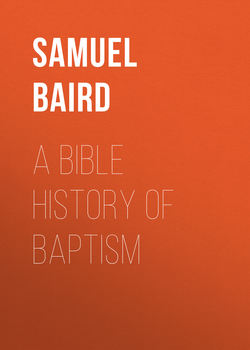Читать книгу A Bible History of Baptism - Baird Samuel John - Страница 8
Book I.
OLD TESTAMENT HISTORY
Part I.
BAPTISM AT SINAI
Section V. —The Blood of Sprinkling
ОглавлениеIn all the Sinai transactions, Moses stood as the pre-eminent type of the Lord Jesus Christ; and the rites administered by him were figures of the heavenly realities of Christ’s sacrifice and salvation. This is fully certified by Paul, throughout the epistle to the Hebrews, and especially in the illustration which he gives of his assertion concerning the divers baptisms imposed on Israel. See Heb. ix, 9-14, 19-28. In these places, it distinctly appears that the blood of the Sinai baptism was typical of the atonement of Christ. Not only in this, but in all the Levitical baptisms, as will hereafter appear, blood was necessary to the rite. In fact, it was an essential element in each of the Old Testament sacraments. The one idea of sacrifice was the blood of atonement. The same idea appeared in circumcision, revealing atonement by the blood of the seed of Abraham. In the passover the blood of sprinkling was the most conspicuous feature; and in the Sinai baptism blood and water were the essential elements.
Peter states the Old Testament prophets to have “inquired and searched diligently, searching what, or what manner of time the Spirit of Christ which was in them did signify, when it testified beforehand the sufferings of Christ and the glory that should follow.” – 1 Pet. i, 10, 11. Of the time and manner they were left in ignorance. But the blood, in all their sacraments, was a lucid symbol, pointing them forward to the sufferings of Christ as the essential and alone argument of the favor and grace of God. In it, and in the rites associated with it, they saw, dimly it may be, but surely, the blessed pledge that in the fullness of time “the Messenger of the covenant” would appear (Mal. iii, 2), magnify the law and make it honorable (Isa. xlii, 21), by his knowledge, justify many, bearing their iniquities (Isa. liii, 11), and sprinkle the mercy-seat in heaven, once for all, with his own precious and effectual blood – the blood of the everlasting covenant. (Heb. ix, 24-26; xiii, 20; 1 Pet. i, 11.)
